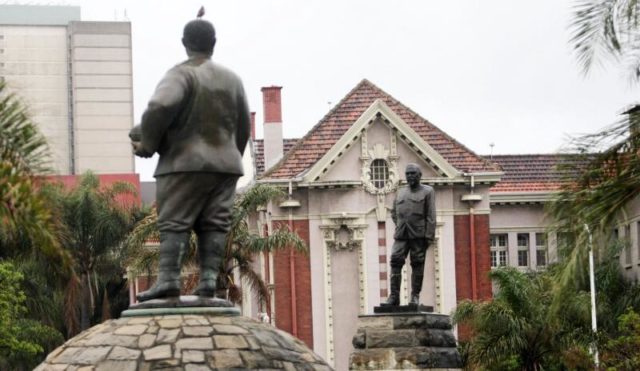Arts and Culture Minister Nathi Mthethwa has mandated the South African Heritage Resources Agency (SAHRA) to conduct an audit of all monuments and statues throughout the country.
Cape Town – Sport, Arts and Culture Minister Nathi Mthethwa has mandated the South African Heritage Resources Agency (SAHRA) to conduct an audit of all monuments and statues throughout the country.
The audit will look into those statues and monuments that are not in line with the spirit and values of the South African constitution with the plan to move some to theme parks.
This was revealed by Mthethwa in respondse to parliamentary questions from DA MP Veronica van Dyk, who enquired about the provinces that made inputs and feedback received on the removal of affected statues, symbols and monuments to theme parks.
Mthethwa said SAHRA would still conduct the countrywide audit of all the statues and monuments.
“Once the national audit has been conducted and completed, my department will commence with the process of identifying statues, symbols and monuments that are not in line with the spirit and values of the South African constitution for relocating, repositioning and curating into regional cultural nation-building parks,” he said.
Mthethwa said a determination would be made where there was a need for the removal and repositioning of some of the symbols and statues once the SAHRA has finalised the audit.
“The process will be guided by SAHRA’S removal and relocation guidelines as per South Africa Heritage Resources Act no 25 of 1999.”
He said the public consultation process would inform decisions on the location of the planned theme parks.
Mthethwa also said no province has yet given input in identifying statues, symbols and monuments.
“Provinces will form part of the steering committee that will drive this process including the necessary consultation processes.”
The initiative comes after a 13-member task team – comprising academics, heritage practitioners and interest groups – was mandated in 2015 to conduct public hearings in all nine provinces on the transformation of South Africa’s heritage landscape.
It was against the backdrop of damage caused during the wave of protest against offensive colonial symbols that swept through parts of the country and saw the Paul Kruger and Jan van Riebeeck statues damaged, among others.
Van Dyk said her party did not have a problem with an audit as it could supplement the existing and incomplete database of the SAHRA.
“While we are not opposed to statues being assessed on a case by case basis, the audit must be participatory and allow communities to have a say,” she said. However, they did not support theme parks.
“It certainly does not contribute to nation-building if the ‘post-colonial and constitutional era’ were to be limited to ANC heritage, instead of diverse figures and events where everyone worked together to bring about a new constitutional dispensation.
“We do not defend colonialism, but we cannot allow the ANC government to use the relocation of statues as a political punch, and therefore want to emphasize that the legal processes, especially community participation and those of interest groups … must be followed according to South African Heritage Resources Act no 25 of 1999 which provides clear guidelines in this regard with the emphasis on community participation.”
She stated that all statues were relevant and that they represented not only the past but also the present and the future.
“Statues represent the rights of cultural groups guaranteed by the constitution in terms of language and culture and stand for a society that places a high premium on cultural respect.
“We believe that as a culturally mature society we must recognise that South Africa’s past is complex and that we must be sensitive to the different contexts from which the South African story originated and must give space to cultural groups to share and celebrate their heritage without fear of condemnation and labelling.”
Political Bureau








